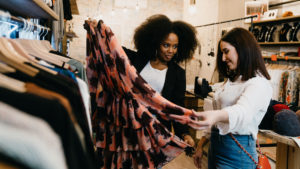
Just a year and a half ago, businesses and consumers watched the world change almost overnight — and, just in the last several months, we’ve watched the world finally start to reopen. How can your organization adjust to the aspects of modern life that won’t “go back to normal” after the pandemic? We held interviews with three experts in our panel to tap into their career experience and gauge their thoughts on a shifting future due to COVID trends that have emerged. Read the start of this story, explore expert insight on disaster preparedness for business continuity, and read on for expert insight on consumer psychology!
To offer you the very best thought leadership, we interviewed Cathrine, a UK-based expert with a Ph.D in Consumer Psychology — specifically, Aesthetic Appreciation of Products. Her doctoral research addressed the use of different variables, especially visual input and touch, to make products more attractive to consumers. To augment her career in psychology research, Cathrine has also applied her consumer psychology expertise to the litigation world as an expert witness for the last several years.
What has Cathrine’s research shown us about the COVID era?
In just the last 14-15 months, Cathrine has conducted consumer psychology research on retail throughout the pandemic with a major emphasis on touch. Much of her research has concluded that the “halfway solutions” forced onto business during this time have left consumers wanting more. To business’ surprise, and contrary to their intentions, these partially-in-partially-out retail environments inspire people to miss the old ways. Most consumers agree that online shopping is easier, but it’s more than just the products — people really miss the physical experience of retail and shopping.
At the start of the pandemic, Cathrine observed, people felt powerless, so they moved toward bulk buying. She prefers this term over “panic buying” — one, for the positive implication, but also because consumers aren’t necessarily panicking; they are making quick decisions in the face of global events. As time went on, consumers and their expectations then became more realistic. (Consider the toilet paper phenomenon and massive flour purchases calming after those first few months of uncertainty.) Cathrine observed Britons and others purchasing specific foods they like — not for their simple enjoyment but because shoppers feared they wouldn’t have “treats” after being in lockdown too long. The driving factor? Consumers’ expectations that they would “feel better” with the urgency that came with almost overnight announcements of the COVID era. Buyers also made, and continue to make, decisions based on erroneous announcements — for instance, state-issued declarations that “the pandemic is over,” or the loosened lockdowns we saw in the U.S. in summer 2020 and around the holidays.
How did Cathrine and her researchers arrive at these conclusions?
Cathrine supplemented consumer surveys and other psychological research methods with media studies, including a concerted mix of media reports with questionnaires to reach as wide an audience as possible, resulting in 600 completed questionnaires.
What does Cathrine’s research mean for my business?
To ensure conclusions will be useful to you, wherever your business’ location, we asked about extrapolating research results from the UK to their global implications. Cathrine’s teams have already seen consistent results in Sweden and in the United States. Her researchers kept their eyes open for outliers, bearing in mind Cathrine’s wisdom that “what is not consistent is always of interest.” She did note that it is difficult for her UK teams to assess whether shoppers in China and India are returning to physical retail, since fewer people have access to the Internet and specifically online shopping.
Cathrine corroborated what you have no doubt seen — consumers direct “disappointment or ire” at the government, at employers, and at other stakeholders in business and litigation. Though we have all had good reason to feel afraid, uncertain, or maligned by global events, such disappointment is not always levied from a fair angle. These new moral concerns create “a different type of challenge” for employers. Cathrine explained that previous understandings about firings had to do with the employee, whereas now global phenomena are responsible for people losing their jobs… so, in many of these cases, it’s “not really anybody’s fault.” As in our prior interview with disaster preparedness expert Steve, Cathrine pointed to previous global crises and how they apply — or don’t. She drew parallels between the COVID era and the financial crisis of the mid-2000’s, where frustrations abounded but were not “not quite the same as a pandemic.” Tangibles, especially, she notes, are tough.
How can I apply these insights to keep moving my business forward?
Most importantly, Cathrine cited uncertainty as a major driver of consumer behavior and business decisions — not just in the last 14-15 months but into the future. Critically for you, a gap is created when retailers see that people can be shaped in terms of what they want. The upshot: Your emphasis should not be placed on shopping but on the good experience of a shopping trip.
What else can you expect, plan and do as the world appears to exit the age of the coronavirus? Our next blog post in this interview series shares insight from a veteran litigator in our network regarding the effects of pandemic adjustments on international litigation, courtroom tactics, employer and union law, ethics, and numerous other specifics.
Keep your eyes open for this next story. Intellex is here to help you navigate complex business and consumer issues — so tap into the Intellex network for the expert you need to advise your business or win your next big case!
Written by Zaq Baker, Senior Recruiter Administrator, Intellex.


